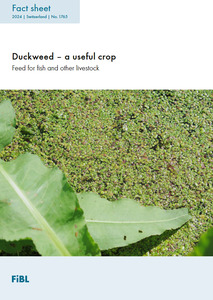{Tool} Duckweed – A useful crop. [Wasserlinsen als Nutzpflanzen.] Creator(s): Stadtlander, Timo. Issuing Organisation(s): FiBL - Research Institute of Organic Agriculture. (2024)
![[thumbnail of 2025-06-02 18_50_57-Duckweed - a useful crop - 1765-duckweed.pdf – Mozilla Firefox.png]](/55780/1.hassmallThumbnailVersion/2025-06-02%2018_50_57-Duckweed%20-%20a%20useful%20crop%20-%201765-duckweed.pdf%20%E2%80%93%20Mozilla%20Firefox.png)  Preview |
Image (PNG)
- Cover Image
- English
736kB |
Preview |
PDF
- Published Version
- English
2MB |
Preview |
PDF
- Published Version
- German/Deutsch
2MB |
Preview |
PDF
- Published Version
- French/Francais
2MB |
Document available online at: https://www.fibl.org/de/shop/1765-duckweed
Summary
This factsheet addresses the main challenges for production. The latest findings from FiBL, the ZHAW and other international research projects emphasize the potential of duckweed as animal feed. This factsheet also points out the open questions, for example, in the area of biosafety, the legal basis for using liquid manure as a nutrient substrate, or the shelf life of duckweed as animal feed.
Summary translation
Wasserlinsen sind wertvolle Proteinträger und mögliche Nutzpflanzen für die Tierernährung. Das Faktenblatt thematisiert die grössten Herausforderungen für die Produktion. Aktuellste Forschungsergebnisse des FiBL sowie der ZHAW und weiteren internationalen Forschungsprojekten unterstreichen das Potenzial von Wasserlinsen als Futtermittel. Das Faktenblatt verweist auf die offenen Fragen beispielsweise im Bereich der Biosicherheit, der gesetzlichen Grundlage zur Verwendung von Gülle als Nährsubstrat oder der Lagerfähigkeit von Wasserlinsen als Futtermittel.
| EPrint Type: | Practice tool |
|---|---|
| Teaser: | Feed for fish and other livestock. |
| What problem does the tool address?: | Animal husbandry on land and in water accounts for a significant proportion of agriculture’s ecological footprint. The poor ecological balance of animal husbandry is attributable in particular to the cultivation of feedstuffs. Globalised production and the import of animal feed also cause a wide range of problems worldwide. |
| What solution does the tool offer?: | Locally produced feedstuffs, on the other hand, can increase the sustainability of animal feed in the long term. Duckweed is very suitable in this respect and can contribute in a meaningful way. |
| Country: | Switzerland |
| Type of Practice Tool: | Leaflets & guidelines |
| Keywords: | aquaculture, feeding, animal nutrition, feed processing, feed quality, proteins, insect farmig, feed technology, sustainability |
| Agrovoc keywords: | Language Value URI English aquaculture http://aims.fao.org/aos/agrovoc/c_550 English feeding http://aims.fao.org/aos/agrovoc/c_2838 English animal nutrition http://aims.fao.org/aos/agrovoc/c_27925 English feed processing http://aims.fao.org/aos/agrovoc/c_16127 English feed quality http://aims.fao.org/aos/agrovoc/c_15850 English proteins http://aims.fao.org/aos/agrovoc/c_6259 English feed technology http://aims.fao.org/aos/agrovoc/c_9c578a8a English sustainability http://aims.fao.org/aos/agrovoc/c_33560 |
| Subjects: | Animal husbandry > Feeding and growth Animal husbandry > Production systems > Aquaculture |
| Research affiliation: | European Union > Horizon Europe > OrganicTargets4EU > selected tools Switzerland > FiBL - Research Institute of Organic Agriculture Switzerland > Animal > Aquaculture European Union > Organic Farm Knowledge |
| Horizon Europe or H2020 Grant Agreement Number: | 101060368 |
| Related Links: | https://organic-farmknowledge.org/tool/55780, https://organictargets.eu/, https://organic-farmknowledge.org/tool/55777, https://organic-farmknowledge.org/tool/55779 |
| Project ID: | OFK |
| Deposited By: | Rüger, Madelaine Lea |
| ID Code: | 55780 |
| Deposited On: | 10 Jun 2025 09:06 |
| Last Modified: | 10 Jun 2025 09:06 |
| Document Language: | English, German/Deutsch, French/Francais |
| Status: | Published |
Repository Staff Only: item control page

 Download Statistics
Download Statistics Download Statistics
Download Statistics
